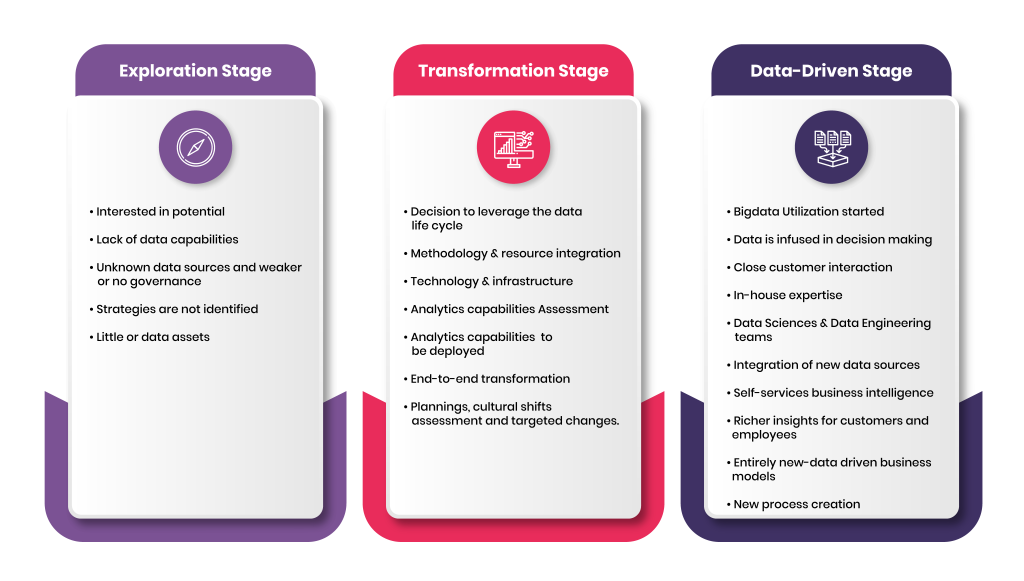5 ways that help you become the next data-driven organization
November 14, 2022
Companies all over the world are rapidly working towards becoming data-centric as uncategorized user data is increasing at a steady rate. The rate at which data is available determines the rate at which decisions can be made. This data is viable for delivering a seamless customer experience at every touchpoint. That’s why organizations are pouring a lot of resources into becoming truly data-driven organizations.
Right now, the biggest challenge for many organizations is to adopt a data strategy that works as per their business models. Infrastructure and revenue aren’t barriers for many. Indeed, they are the induction of the right strategy and growth mindset. To make this happen, we have identified some steps that will help you drive your organization to become a data-centric organization, but first let’s explore the imperativeness of a data-driven organization.
Why is a data-driven culture important?
To stay competitive in today's fast-moving market dynamics, a data-driven organizational culture must be at the core of digital transformation strategy. Becoming a data-driven organization empowers teams to make solid decisions, become more productive at work, and increase the effectiveness of future decisions.
Experts at McKinsey Global found that organizations that rely on data-driven processes are 23 times more likely to acquire new customers, 6 times more likely to retain existing clients and be 19 times more profitable than before.
Transition into the data-driven company now – Here’s how
Apart from tools, infrastructure, and resources, the following are some necessary steps that you need to take to become a truly data-driven organization.

1. Invest in the right tools to improve data utilization
Integrating the right tools and technology is necessary that’s why it’s on the rise. Legacy systems hinder an organization's ability to adopt new ways of working, which also results in siloed data. While employees are always forced to adopt new mindsets and cultural traits, legacy systems hamper their ability to act more precisely and embrace change.
Before fitting any technology stack, organizations should rethink which tools are most useful to impact the organization and work culture more quickly.
Modern technologies like predictive intelligence and AI-powered analytics should be combined with collaborative tools to create more interactive data insights. Another thing to empower your teams is to make sure that that data is readily accessible to authorized individuals.
2. Data should be processed in real-time
One of the most common challenges faced by many organizations is the “time lag. For many, it’s a serious concern because the data sources are continuously increasing, and they are unable to incorporate the changes.
So, what is needed? A flexible data ecosystem that can integrate new data sources from internal and external parts of your organization. Real-time data availability will reduce latency and the data will be available for informed decision-making in more robust ways.
3. Data-driven processes, decisions, and interactions
McKinsey believes that “by 2025 most companies will be using data to optimize their operations and empower better decision-making”.
Organizations are bringing initiatives to increase data utilization, but these are often occasional. In most cases, they’re not properly emphasized at the organizational level. These actions might remain limited to departments, within specific teams or to certain use cases.
The challenge is to spread this thinking and data utilization to every part of the organization at every level. In certain cases, the data is often siloed or available for the experts only. So, either the data should be available for utilization with limited support from experts, additional skills, or accessibility standards. Every team should be able to utilize this data at every part of their decision-making journey.
4. Invest in training & resource development
To have any chance of success, a data-driven culture starts from the top. The culture should be prevalent in C-suites and should have a trickle-down effect throughout the organization. Before an enterprise’s top management starts with data-driven adoption, they need to understand that change starts from the leadership. You also need to let people know what effects they would have and what possible changes they may have to face.
Once, you as a business leader, have recognized this, the next big thing is to adopt a never-stop-learning approach. This comes from the top management. To put the rules into practice,
the next investment should be in the training and development area. Teams should be motivated to create test projects to leverage their data analytics, business intelligence, coding, and AI skills.

5. Infuse a scalable data governance architecture
A data governance framework should be the top choice for any organization that is looking to become a data-driven firm. This establishes the process and responsibilities that ensure the quality and security of data within the organization. Data governance backs the actions in certain situations using certain methods.
A well-crafted data governance architecture is fundamental because it defines how organizations are going to tackle big data challenges, processes, and responsibilities related to data. The data governance architecture should be agile enough to cover strategic, tactical, and operational roles and responsibilities related to data.
Embracing the data-driven era
The unprecedented growth of data in the past few years has led us toward a data-driven era. To fast-track their decision-making, businesses are banking on business intelligence and data analytics tools now. Of course, data is new and driving organizations to grow faster than ever. Data ecosystems and their usage are becoming more available to non-technical employees, which means the solutions are getting more viable with each passing day.
However, big data, analytics, or self-services aren’t a one-size-fits-all solution. The organization should have identified goals and must be aware of employees of the changes they will face once a working data ecosystem is acquired. To generate the best results, we have identified some of the key steps that organizations have to take while infusing a data culture.
At Systems, we know to believe in the power of data and know how to help companies to drive business value from a data-driven culture. Talk to our experts, to learn more about turning your company into a data-driven organization.
Quick Link
You may like
How can we help you?
Are you ready to push boundaries and explore new frontiers of innovation?


